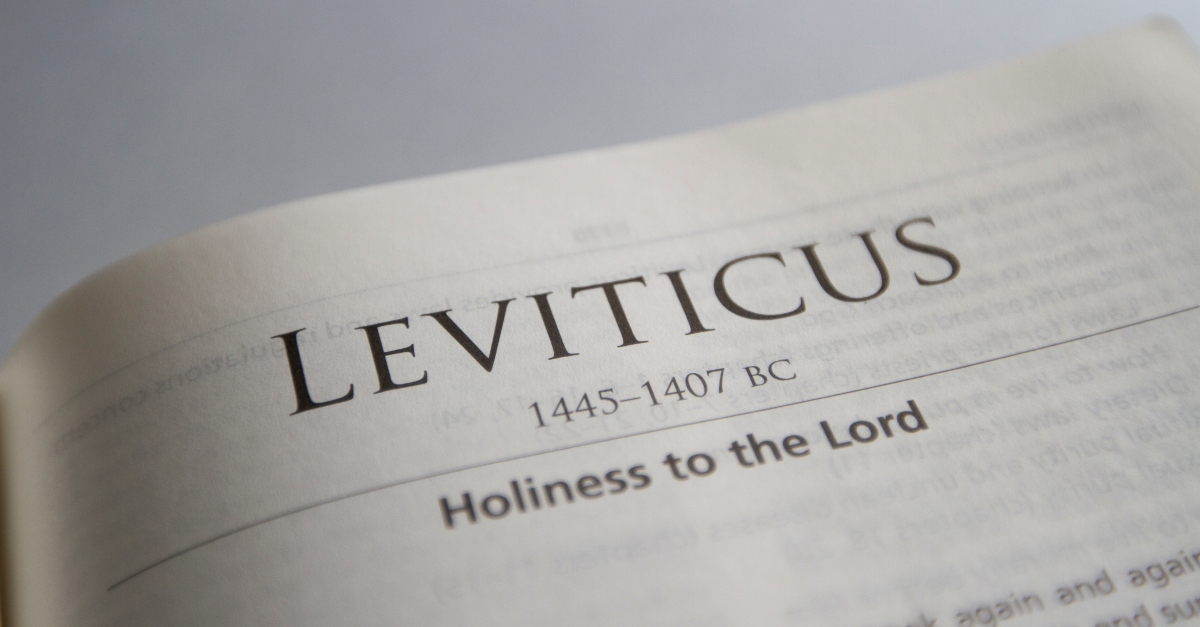These are all of the chapters of the book of Leviticus. Clicking on a chapter will show you the text of that chapter of Leviticus in the Bible (New International Version).
Leviticus is the third book of the Bible. It is located within the first five books called the Pentateuch. In Jewish tradition, this location is called the Torah and it is mostly agreed upon that Moses penned this book. Evidence of this includes the direct relation of content in Exodus to Leviticus.
The word Leviticus derives from the tribe of Levi. The law given in this book deals specifically with priestly behaviors. The tribe of Levi was chosen by God to become the priests of His people, the Israelites. Scholars believe this book was written over the course of a long period of time, therefore, there are no specific dates listed.
This book is written during the time the Israelites are camped at Mt. Sinai. They have left Egypt and are preparing to embark on the long journey through the wilderness. Up to this point, God has not dwelled among them. He has watched over them and shown His mightiness with the plagues in Egypt and parting of the Red Sea.
But it is at this time that God intends to dwell among His people. The Tabernacle has been built so that God has a place. Before He can enter the Holy of Holies to live among His people, there needs to be some instruction. This divine/human relationship cannot happen unless the Israelites know how to deal with their sin and impurities.
The vast majority of the instruction in Leviticus is toward the tribe of Levi. The Levites were to be the priests of God’s people. The Levitical law lays out the way a priest should live and what is required of their holy appointment.
Within the book of Leviticus, there are three main themes. These themes are woven throughout the text in order to assist the Israelites in becoming the people God wanted them to be. The entire purpose of the Levitical law was for the people of Israel to be able to live within the midst of Christ.
The first theme is the most prominent. It is the concept of holiness. To be holy is to be set apart. In Leviticus 20:26 we find God speaking about his people and how they are to be holy because He is holy. They are to be set apart from other nations because they belong to him.
God has not dwelt on the Earth since the Garden of Eden. He has now come back to dwell among the Israelites in the Tabernacle. The words of Leviticus teach the fine details of becoming holy to God’s people. It also opens the eyes of the people of Israel to understand just how holy their God is.
The second theme in Leviticus is how we deal with sin. God is pure and He knows that his people are not. They are sinful and will need to deal with that sin to be in His presence. In the Levitical law, we see blood sacrifices to atone for the sins of the people. This is a picture of Jesus, who will be the ultimate sacrifice in the New Testament. Sin would require a sacrifice, which meant that there would have to be a life for a life.
Lastly, we see the theme of worship. Through the law, God is giving His people a way into His presence. He is laying out what it will take to enter into this divine relationship. The rules in regard to daily living were laid out. Nothing was left to chance. God wanted His people to know exactly what needed to be done. He was designing the perfect plan to be with His people.
Leviticus is an Old Testament book that has many modern lessons for us today. The most important lesson in Leviticus has to do with sin. Sin is not a casual event or affair. It is serious and there has to be atonement for it. In the time of Leviticus, that atonement was the sacrifice. There had to be blood spilled. God sent His son, Jesus, to be the ultimate sacrifice. This picture is shown every time an animal had to die as a sacrifice.
In today’s society, sin is not viewed as seriously. We have even given levels to sin and developed a gray area for it. What God was saying in Leviticus is that there is no gray area or level to sin. Sin is sin and we have to repent and turn from it. Jesus already paid the price and for us to be in a relationship with Him, now we must ask for forgiveness.
Another lesson we find is that blessings will follow obedience. If the Israelites would only strive to obey God’s law, He would bless them. He would give them everything they needed. They would be protected from all dangers. This is true today. If we can read God’s word and follow His instruction, He says that He will bless us too. We will have everything we need and more. His guidance, wisdom, protection, and so much more can be ours if we only obey.
The last big lesson in Leviticus is one that is wrapped in holiness. Being holy is mentioned many times in this book. To be holy is to be set apart and totally committed to God. As God’s people the Israelites were to strive to be holy and pure. Today, we are to do the same. If we are sold out to God, we are striving each day to be holy and pure. God wants a relationship with us that is not shared with anyone or anything else. We must be sold out to Him.
Leviticus 6:7, “In this way the priest will make atonement for them before the LORD, and they will be forgiven for any of the things they did that made them guilty."
Leviticus 17:11, “For the life of a creature is in the blood, and I have given it to you to make atonement for yourselves on the altar; it is the blood that makes atonement for one's life.”
Leviticus 19:2, “Speak to the entire assembly of Israel and say to them: Be holy because I, the Lord your God, am holy.”
Leviticus 19:12, “Do not seek revenge or bear a grudge against anyone among your people but love your neighbor as yourself. I am the LORD."
Leviticus 20:26, “You are to be holy to me because, I, the Lord, am holy, and I have set you apart from the nations to be my own.”
Leviticus 27:30, “A tithe of everything from the land, whether grain from the soil or fruit from the trees, belongs to the LORD; it is holy to the LORD."
Learn Religions: Introduction to the Book of Leviticus, Mary Fairchild
Simple Lessons from the Bible: Life Lessons from the Book of Leviticus
ESV Study Bible: The Global Message of Leviticus
Photo credit: ©Sparrowstock
 Ashley Hooker is a freelance writer passionate about missions. She has collaborated with mission teams in North Carolina, Mississippi, Texas, West Virginia, and Vermont. Presently, she lives in North Carolina with her husband and two children, where she fulfills roles as a pastor's wife, a dance mom, and a farm girl.
Ashley Hooker is a freelance writer passionate about missions. She has collaborated with mission teams in North Carolina, Mississippi, Texas, West Virginia, and Vermont. Presently, she lives in North Carolina with her husband and two children, where she fulfills roles as a pastor's wife, a dance mom, and a farm girl.
